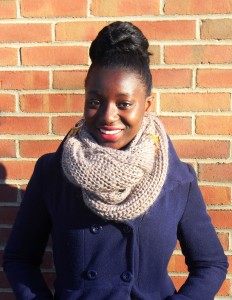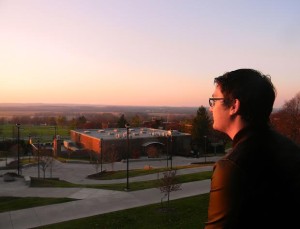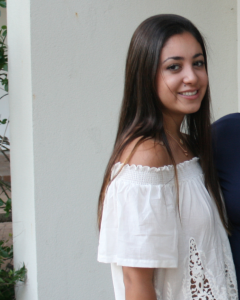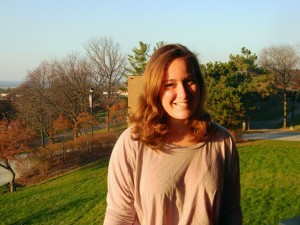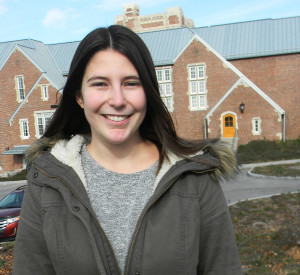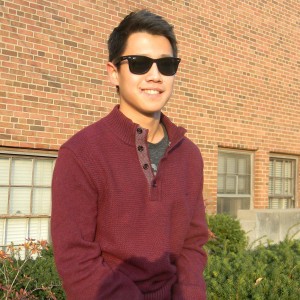There’s this place my dad used to “invite” my sisters and me to visit when we were younger: the Sterling Nature Trails. There we were, sleeping soundly in our beds on a Sunday morning, when suddenly, I heard it. The creaking of the screen door at the front of our house opening and the slamming that followed as it whipped shut. I knew this had meant my dad was home from church, and also that I had evidently slept through it… again. My parents had always bragged about how well-behaved I was when I was younger, especially in church. While other four-year-olds squirmed and whined throughout mass, I would sit quietly between my parents, my hands folded nicely in my lap, smiling sweetly at the old ladies who remarked how pretty my Sunday dress was. But that was years ago, and as I grew older, I was beginning to shape my own beliefs about the world around me. Still, guilt managed to creep into my conscience when I pictured my parents at church without me.
Just as I was making a mental note to join them next Sunday, my dad’s voice interrupted my thoughts.
“WAAAAAKE UP EVERYBODY!” his voice echoed through house. In a feeble attempt to ignore him, I put my pillow over my head, and I knew across the hall my younger sister, Natalie, was probably doing the same. It was never to any avail, however, because, as usual, my dad proceeded to travel down the hall, singing whatever closing hymn he had sung in church that morning.
“THIS IS THE DAY THE LORD HAS MADE, LET US REJOICE AND BE GLAD….” With every word he grew closer and closer until–
BANG!
My door flew open, and there he was, standing with his plaid shirt tucked into his jeans.
“What are you doing!?” he demanded. “It’s a beautiful day!” With an expression of disgust, he made his way through my obstacle course of a room and opened my curtains, as if the sunlight that was now blinding me was supposed to motivate me to move. Instead, I cursed him silently and burrowed further into my bed.
“You lazy bums!” he exclaimed, and I heard him repeat this routine in my sister’s room.
“Get up,” he declared. “We’re going on a hike!”
We simultaneously groaned in protest — but secretly we were willing to go. An hour and a half later — because this was how long it took my thirteen-year-old self to put on the perfect hiking outfit — we were ready.
Now, my dad’s idea of the “perfect hiking outfit” was a bit different than mine. I dressed like someone out of a J. Crew catalogue — or at least that’s what I thought I looked like. In reality, I looked like an awkward tween who hadn’t yet grown into herself, my sweater baggy and my skinny jeans loose around my twig-like legs. My dad on the other hand wore a fisherman’s vest atop his plaid shirt. He’s never gone fishing in his life, so why he has a fisherman’s vest, I will never know. The outfit wasn’t complete without his matching bucket hat, and, taking one look at him, I thought only one thing: My dad is a complete and utter dork. Even Natalie, who was so severely lacking in the ability to match her clothing that she still had my mother pick out her outfit at the age of ten, rolled her eyes at his appearance.
Finally, we hoisted ourselves into his green truck — a Dodge Ram 1500 that he washed much too often and was much too proud of. My mom and youngest sister, who was only six and too little and impatient to join us, waved from the door as we prepared ourselves for my dad’s playlist consisting only of songs by Genesis, Paul Simon, and Tom Cochrane. We reluctantly sang along to the lyrics we had grown up hearing, like an anthem to our childhood, the cool wind causing our hair to whip about our faces.
When we actually reached the trails, which took longer than the average person to do, considering my dad’s love for detours on dirt roads that showed off his truck’s four-wheel-drive capabilities, the previous embarrassment of his dorky tendencies faded away. The feeling was instead replaced with a peaceful one. As soon as we walked through the gated entrance, we had a choice to venture either upwards to the bluffs, or downward to the lake. We chose the former, saving the trip to the lake for a warmer day, and set off on the man-made path into the woods.
The quietness around us wasn’t unsettling like it is in scary movies, but comforting. At thirteen, I had just begun middle school. I was used to noise: the slamming of lockers, the excited squeals of girls greeting one another in the morning, as if they hadn’t just seen each other the day before, the various beeps, vibrates and rings of cell phones, indicating your crush may or may not have just texted you. It was new and exciting, but mostly overwhelming. Before we went any further, I stopped to turn off my own cell phone, wanting to enjoy this rare silence without distraction. While I did this, my dad wandered off the path a little ways, seemingly searching for something. My sister and I exchanged quizzical looks, but before we could ask what he could possibly be doing, our question was answered.
“Aha! Here it is!” he proudly held up a large stick and clambered over the various rocks and roots back onto the path.
“The perfect walking stick,” he said, thumping it into the ground, testing its sturdiness under his weight. Satisfied, he led the way up the path.
“Hey Hannah, look over there!” My sister pointed toward a small clearing that we could see through the trees.
“What about it?” I asked, confused as to what was so interesting. She giggled, making her short blonde ponytail bounce.
“It looks like the scene from Twilight where–!” Without thinking, I shot her an annoyed look that cut her off. As with most younger sisters, Natalie was always copying me and it was one of my biggest pet peeves. Naturally, as soon as I showed the slightest interest in anything, in this case the Twilight series, she became obsessed with it and brought it up every chance she got.
“Nevermind,” she mumbled, trudging forward up the slope. I sighed irritably. I hated when she made me feel bad.
“You’re right, it did look like Twilight,” I admitted, and my approval was enough to make her toothy smile appear again.
“What’s this I hear about Twilight?” my dad called from further up the path, squinting back at us, shielding his eyes from what little sunlight was peeking through the treetops. “You’re supposed to be enjoying the great outdoors! C’mon!”
We walked around the winding path, my dad leading the way, but pausing patiently now and then to wait for my sister and me, our shorter legs preventing us from taking the large strides that he could. I breathed in deeply, enjoying the honey-sweet smell of the leaves that rustled and swished around my ankles. When I looked up, I could see the sun through the half-naked tree branches, which were spotted with leaves, some still green, peeking through their older red, yellow and orange cousins.
We travelled for hours, up and up, yet never got lost. When we came out, we suddenly found ourselves at the edge of the bluffs, feeling exhilarated and scared at the same time, as we peered over the rocky ledge at the lake below. Years of erosion from Lake Ontario had made these cliffs, the dirt lining them dried-out and dusty, the water below blue, clear, and welcoming. Unlike most lakes, you couldn’t see to the other side. It was so vast, tourists sometimes mistook it for an ocean. As I stared out at the scene, all I could see was the faint line where the sky met the water, the two blues blending together. It was dizzying. In that fleeting moment, I was terrified, but my dad was always there, and if he was there, I couldn’t fall.
My sister’s shrill laugh pulled me back to reality. I turned to look at her as she ran away from my dad, shrieking as he playfully chased her, attempting to “throw” her over the edge. As I looked, I noticed — not his New Balance sneakers, which were the true markings of a middle-aged dad — but the crinkle in his skin at the corner of his eyes that was more pronounced as he laughed with my sister. I saw the gap between his two front teeth, and felt with my tongue where the same gap was between my own teeth, a space that braces would correct in later years.
I never really understood why I grew to love that place so much or why, no matter how many times my dad brought us there, I never got used to the mesmerizing beauty of it. I could never put my finger on that feeling, and even though I’ve visited the bluffs many times since then with my friends, it’s never felt the same as it did when my dad used to take us.
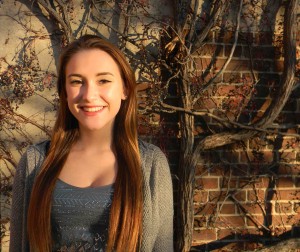 Hannah Griffin is a freshman at SUNY Geneseo majoring in English. Much of the inspiration for her writing comes from her hometown Oswego, NY. Aside from writing, Hannah’s passions include singing, fashion and, of course, her cat Casey.
Hannah Griffin is a freshman at SUNY Geneseo majoring in English. Much of the inspiration for her writing comes from her hometown Oswego, NY. Aside from writing, Hannah’s passions include singing, fashion and, of course, her cat Casey.


